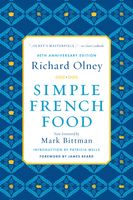Advertisement
Wine in Cooking
Appears in
Published 1974
I do not want to suggest that cooking with wine is a special kind of cooking in a world apart—it is not (any more so than cooking with onions, cooking with herbs, cooking with carrots, eggs, or bread). It is as natural and as logical a moistening agent in viti-cultural country as is milk in dairy country or water the world round. And yet, be it the responsibility of innocence, cynicism, or a super, but questionable refinement, the concept seems sometimes hopelessly clouded.
In innocence, many believe that a product designated as “cooking wine” has a place in the kitchen (nor are foreigners the only sinners—many a Frenchman is convinced that if a recipe calls for “very good wine,” it means a cheap wine that titles 12 or 13 percent alcohol rather than a meager 10 or 11 percent). To taste a dish in which a dishonest wine has been used is conclusive, but that should not be necessary; it is only too reasonable to assume that a wine not good to drink can bring no positive quality to a cooked preparation. There should be no question of using a wine in the kitchen that one does not consider good enough to serve at one’s table (which is not to say that wine should not be kept in the kitchen for cooking purposes—ends of bottles should certainly be kept, wines of a color poured together and corked in bottles or half-bottles, protecting them as nearly as possible from contact with the air).


